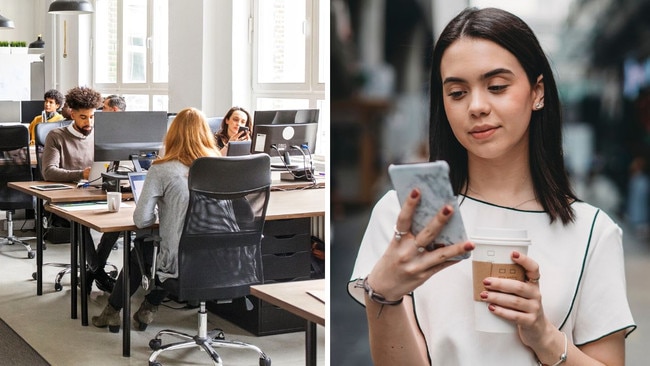Sneaky trick Gen Z workers are using to avoid returning to the office
CEOs are continuing to push for workers to come back into the office – but young employees have figured out a sneaky way to get around the rule.

At Work
Don't miss out on the headlines from At Work. Followed categories will be added to My News.
Workers are doing everything they can to resist being forced back into the office, as an increasing number of workplaces push for a return to pre-pandemic working arrangements.
Covid and the subsequent lockdowns forced people to adapt to working remotely, and now that so many people realise their jobs can be done equally as well – and even more efficiently – at home, they are reluctant to heed calls from old-school CEOs to return “to the way things were”.
Gen Zers in particular, who champion work-life balance more than any other generation, have embraced hybrid and remote working with open arms.
This is the generation that has created countless trends focused on not letting work take over your life, such as “quiet quitting”, “lazy girl jobs”, and “bare minimum Mondays”.
So, of course, they are going to find a workaround when their boss tells them they need to increase their in-office days to “socialise” with the team and be part of the “office culture”.
And the solution they have come up with is called “coffee badging”.
Essentially, workers will go into the office on their required days, have a coffee, catch up with their co-workers and maybe swing buy their boss’ desk for a chat.

However, when the morning rush is over and everyone is settling into their work, that employee will sneak out of the building and head back home to get their work done without the distractions of the busy office.
Earlier this year, a survey of 2000 full-time employees in the US found 58 per cent of hybrid employees have coffee badged in the past, with a further eight per cent saying they hadn’t but would like to try it.
Dr Anna Denejkina, PhD, Research Director for YouthInsight, told news.com.au that the coffee badging trend effectively merges the social benefits of life in the office with the “productivity boost of remote work”.
“This trend is an example of the workforce dynamics that are impacting Gen Z and young workers and their approach to work-life balance,” she said.
“By understanding these trends, we can better support the next generation of the workforce and ensure that they are equipped to thrive in this ever-changing environment.”
Dr Denejkina said it was clear that the concept of “work” was evolving and employers needed to keep up with these changes by “striking a balance that enhances productivity while keeping employees satisfied is the new challenge”.
She said a modern workplace must be flexible, supportive and be able to adapt to individual work styles, while urging leaders not to scrutinise employees who choose to spend less time in the office.
“If productivity and wellbeing are not negatively impacted, there’s no need to resist this change,” Dr Denejkina said.
Joy Adan, senior thought leadership manager at Reward Gateway, an employee engagement company, said that connecting with co-workers and building those relationships were a critical part of work and should not be trivialised.
“Coffee badging could be employees proactively and intentionally devoting their in-office time to connect with their colleagues over a coffee or meal, and thereby building connections,” she said.
“Rather than providing generic return-to-office instructions, people leaders could use this trend to their advantage by clearly articulating and setting up activities that show employees how they can best utilise their in-office days.”
Ms Adan said this could include scheduling team lunches, one-on-ones with employees and their manager, mentoring opportunities or even walking meetings.

This latest work trend is reflective of Reward Gateway’s recent Talent and Engagement report, which showed 59 per cent of Aussie employees said flexibility in work location and a feeling of belonging at work were more important to them than a 10 per cent pay rise.
Ms Adan said that, for some employees, coffee badging may be a “really smart” use of their time.
“If employees prefer to focus on developing close connections in the office, while prioritising more ‘productive’ work at home, then that might actually be a really smart use of time and space, which leads to a healthier work culture both in the office and at home,” she said.
The senior manager said employers and organisations pushing for employees to return to work or navigating hybrid arrangements should be asking themselves “why”.
“Why is in-office work the answer to your business challenges? Why will physical proximity help us connect, collaborate or improve productivity, and how can employees take advantage of it?” Ms Adan said.
“Understanding the ‘why’ will also enable the creation of other ways to build connections and increase visibility for those who either can’t, or find it hard to work in the office.”
Originally published as Sneaky trick Gen Z workers are using to avoid returning to the office




